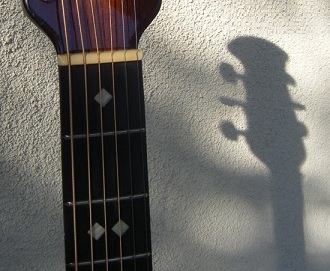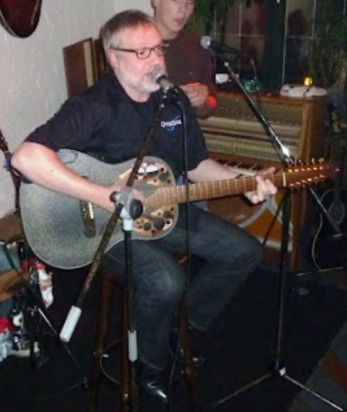|
|

Joined:
February 2016
Posts: 1882
Location: When?? | This may sound like a minor detail, or, then again, maybe some people consider it an essential standard—but when stringing a guitar that has its bridge glued to the top wood, is it considered good practice to start with the center strings (G&D) first and then alternate your way outward? I always do, but yet wonder if it really matters in guitar world as much as it does in mechanic world where nuts & bolts must often be tightened in specific sequence and incremental torque. In other words, if you start with an outer string and work your way across the bridge (especially if you begin with the heavy E string) is that initial tension on only one side of the bridge truly balanced away by the time you get to the other side, or is there a tiny imbalance of pressure remaining on the start side that could cause cross-skewed tension with years of ever-so-micro slipping leading to eventual lifting? |
|
| |
|
Joined:
November 2002
Posts: 3663
Location: Pacific Northwest Inland Empire | This sounds like theoretical versus empirical. Probably doesn't make much difference, unless you are replacing the strings, one-per-day. :-) |
|
| |
|
Joined:
November 2002
Posts: 3663
Location: Pacific Northwest Inland Empire | BTW, where? I grew up in Hanford. |
|
| |
|
Joined:
October 2014
Posts: 270
| You could always remove just one string, replace it, move on to the next one, remove and replace it, etc. Do I do this? No. Have I ever had a problem? No. |
|
| |
|

Joined:
February 2016
Posts: 1882
Location: When?? | @seesquare -- >>This sounds like theoretical versus empirical.<<
Exactly... but sometimes a guy needs to ponder something.. anything.. in order to fall asleep. I think I used this one a couple weeks ago on a hard, crappy hotel bed.
>>BTW, where? I grew up in Hanford.<<
Hangin' out here in the "F" town.
|
|
| |
|

Joined:
February 2016
Posts: 1882
Location: When?? | @Bcam -- >>You could always remove just one string, replace it, move on to the next one<<
I fully agree that one-at-a-time would satisfy the whole tension equation just peachy, but I like to have the fingerboard, sound hole and saddle fully open and accessible during string changes to service everything properly.
Edited by Love O Fair 2016-12-22 12:27 PM
|
|
| |
|
Joined:
December 2004
Posts: 578
Location: Denmark | I remove all clean the fretboard etc. and string all 6 strings, but I mostly tune up evenly. That habit may be inherited from string change on a stratocaster where the tremolo makes it difficult to know exactly which pitch a string will have after tuning the other strings. Never really analysed it as such ... |
|
| |
|
Joined:
March 2005
Posts: 12761
Location: Boise, Idaho | For the same reason as tpa, I take all the strings off. I usually just cut them in half so they're easier to pull through the bridge. I don't have any guitars with bridge pins. I probably wouldn't cut them in half if I did.
I've started with low E and then high E and worked toward the middle and also started with low E and then G when the come with two strings in the same envelope. Most times I start low and work up to the high string. I've never noticed a difference with any of those methods.
I don't tune until all 6 are on and then work from low to high. I always have to go back and retune a couple times and then the next day when they stretch. I've stretched strings as I put them on, but they still seem to go a little flat by the time I've tuned the high E.
Edited by Mark in Boise 2016-12-22 5:11 PM
|
|
| |
|

Joined:
September 2006
Posts: 10777
Location: Keepin' It Weird in Portland, OR | Okay... I put on the "e" and "B"...
Then I put on the "E" and "A"...
Then the final two.
Why?
D'Addario strings come coiled-up in pairs like that.
|
|
| |
|

Joined:
June 2012
Posts: 2345
Location: Pueblo West, CO | I take them all off, clean the guitar, oil the fretboard, then put the new strings on. In truth, it doesn't really matter what order you put the new strings on as long as the saddle remains seated in the slot.
Torquing a cylinder head is done in a specific order is done to ensure that the gasket seals properly. Different beast and has no comparison to guitar strings. For example, light guitar strings exert ~155 Lbs. of pull at concert pitch. In contrast, a cylinder on an automotive engine exerts over 13,000 Lbs. of force on the head bolts at wide-open throttle. |
|
| |
|

Joined:
December 2015
Posts: 287
Location: Katmandu | Same as Dan.
After undressing I give the lady a proper cleaning, oiling, then I'm ready to put new strings on. I'll start with the low wound E string and work my way towards the high E simply because I wouldn't want any string to get in my way when restringing.
After installing one each string gets tuned to concert pitch by ear just to give the string some tension to hold my loose saddle in place.
After completely restringing I will tune up all the strings to concert pitch and, because I'm mostly using coated strings on my Ovations (D'Addario EXP16), I will then stretch each string individually so that it no longer easily loses pitch (just like this guy in this video). No matter how you restring (from high to low, low to high, inwards to outwards) your bridge should hold, otherwise you've got a bridge problem.
Edited by leonardmccoy 2016-12-23 4:48 AM
|
|
| |
|

Joined:
May 2011
Posts: 760
Location: Muenster/Germany | Wenn der Liebe Gott seine 12string slothead Gitarre neu besaitet hat, fragt er sich immer wieder, wie er so einen Scheißdreck hat schöpfen können.(Maybe someone can translate that for me in english...) |
|
| |
|

Joined:
February 2016
Posts: 1882
Location: When?? | @DanSavage-- >>In contrast, a cylinder on an automotive engine exerts over 13,000 Lbs. of force on the head bolts at wide-open throttle.<<
I agree.. but the cylinder head isn't held on with glue and has no opportunity to "rotate".. so my thoughts more applied to a slow, very tiny, "laterally-skewed" slippage of the bridge across the top wood over time that one day.. pop!.. ends up with the bridge lifting... whereas if tensions were initially applied equally to the bridge from the center out, this skewing force may never exist in the first place. Mechanically speaking, I guess I'm comparing more to a wheel lug nut tightening sequence and equal seating around the hub than that of head bolts, hence, if lug nuts loosen from improper tightening sequence, the ones that come loose will be next to each other, not across the wheel from each other.
Edited by Love O Fair 2016-12-23 3:30 PM
|
|
| |
|

Joined:
February 2016
Posts: 1882
Location: When?? | Be sure to tune in next week when we discuss the little nit-noy details of the numerous soap-bubble-making machines I've ever designed in my head as a means of falling asleep. Lawrence Welk's stage crew's got nothing on me-- but guitar stringing can only go so far.. lol.
In the meantime.. here's wishing everyone here a very Merry Christmas as I dive into the abyss of in-laws, and the old quandary of whether it is or isn't actually dangerous to wad and toss used gift wrapping into the fireplace. |
|
| |
|

Joined:
September 2006
Posts: 10777
Location: Keepin' It Weird in Portland, OR | Love O Fair - 2016-12-23 3:24 PM
...the old quandary of whether it is or isn't actually dangerous to wad and toss used gift wrapping into the fireplace.
You get to do that?
My Mom used to make us open packages carefully so that she could save the wrapping paper.
And I all those years I NEVER saw a package wrapped with used paper.
This ain't just when we were kids... She made us do this as adults too. 
This is why I coil-up all my used guitar strings and save them (pin bridge only).
You can re-use the long scale strings on short scale guitars.
|
|
| |
|
Joined:
March 2005
Posts: 12761
Location: Boise, Idaho | My dad made us save the used stuff and we should have been suspicious of this Santa Claus who reused our old paper. Christmas was a lot more fun with kids around. |
|
| |
 Re-stringing Sequence..
Re-stringing Sequence.. Re-stringing Sequence..
Re-stringing Sequence..